Allegations of voter suppression have roiled the highly competitive governor’s race in Georgia, making the state the epicenter of a nationwide fight over voting rights in next month’s midterm elections.
Georgia has become “ground zero for voter suppression”, said Gerald Griggs, a vice-president of the state conference of the NAACP.
Georgia is far from the only state to enact more restrictive voting policies in recent years – but it has been one of the most aggressive, researchers have found.
And this year’s race brought a unique twist: Brian Kemp, the man in charge of overseeing elections as secretary of state in Georgia, is himself the Republican candidate for governor. He’s up against Democrat Stacey Abrams who, if elected, would be the first black woman governor in US history.
Civil rights groups have sued Kemp after 53,000 people seeking to register to vote – nearly 70% of them black – had their registrations put on hold because the information they submitted was not an exact match with state records, with discrepancies as small as a misplaced hyphen causing them to be disqualified.
Those people are still eligible to vote in this election if they show up at their polling place with proper ID, but could have their registrations cancelled if they don’t resolve the discrepancies within 26 months.
Another lawsuit was filed over reports that Gwinnett county, the most diverse county in the state, had rejected nearly 10% of absentee ballots sent in by mail, far more than other parts of the state. A judge this week ordered officials to stop rejecting ballots because voters’ signatures did not match, saying they must instead mark the ballots as provisional and give the voter a chance to correct the problem.
Voter suppression charges dominated a debate between the candidates last week.
“People have lost the right to vote in the state of Georgia. They’ve been purged, they’ve been suppressed, they’ve been scared,” Abrams said, adding the problem goes beyond people actually being turned away from polling places.
“The reality is that voter suppression is not simply about being told no. It’s about being told it’s going to be hard to cast a ballot. And that’s the deeper concern that I have because under his eight years of leadership, Mr Kemp has created an atmosphere of fear around the right to vote in the state of Georgia.”
Kemp called the allegations a “farce” and accused Abrams of encouraging immigrants in the country illegally to vote, based on comments where she said the “blue wave” favoring Democrats is “comprised of those who are documented and undocumented”.
“No one’s being denied the right to vote. It’s never been easier to register in our state,” Kemp said.
He stressed that the people whose registrations were put on hold, a category known as pending, will be able to vote.
“This is all a distraction to take away from Ms Abrams’s extreme agenda,” he said. “This farce about voter suppression and people being held up from being on the rolls and being able to vote is absolutely not true.”
Kemp said he would not recuse himself as the state’s chief elections officer even if the race between him and Abrams goes to a recount.
“Brian Kemp is the voter suppressor in chief, and for him to be able to preside over his own election is something new that’s never happened in the state of Georgia,” said Griggs. “It’s highly irregular. We believe it’s unethical, and it’s immoral.”
Every vote could matter: the race is deadlocked, according to an NBC News/Marist Poll released Friday, with 46% of likely voters backing Kemp and 45% for Abrams.
Georgia’s history of making it harder to vote goes back years, and the current secretary of state played a key role long before becoming a candidate for governor.
Georgia purged twice as many voters – 1.5 million – from the rolls between the 2012 and 2016 elections as it did between 2008 and 2012, the Brennan Center for Justice found in a report. Kemp took office in 2010.
It was one of the most aggressive states in the nation in removing voters, alongside Texas and Virginia.
All but three of the state’s 159 counties saw purge rates increase, according to the Brennan Center. The trend has continued in the past two years, during which the state purged more than 10% of its voters.
“Georgia epitomizes a lot of the fights over voting rights that we’re seeing across the country. They’re attacking the vote on multiple fronts, in the context of a highly polarized election for governor,” said Wendy Weiser, director of the Brennan Center’s Democracy Project.
“We’re heading into an election where it’s going to be harder to vote in 24 states than it was in 2010. It’s harder to vote in nine states than it was in 2016,” she said. “We’ve been going in a backwards direction in about half the country. Georgia was a leader of that trend.”
As well as “exact match” laws, Georgia has also implemented a strict voter ID law, cut back on early voting, and attempted to close polling places in a majority black county, a plan that was eventually scrapped.
Many of the new restrictions came after a 2013 supreme court decision that weakened the Voting Rights Act, removing a requirement that officials get federal approval before changing voting policies in southern states.
“States like Georgia and other southern states … now are free to conduct their elections as they see fit. That’s why we’re seeing more action in these southern states, because they’re now empowered to do that again. And these states also have problematic histories,” said Greg Shufeldt, an assistant professor of political science at Butler University.
The state’s restrictions could be particularly consequential in such a close statewide election.
“What’s happening in Georgia isn’t necessarily unique to Georgia,” he said. “It absolutely matters more in Georgia than in other states this election cycle.”








